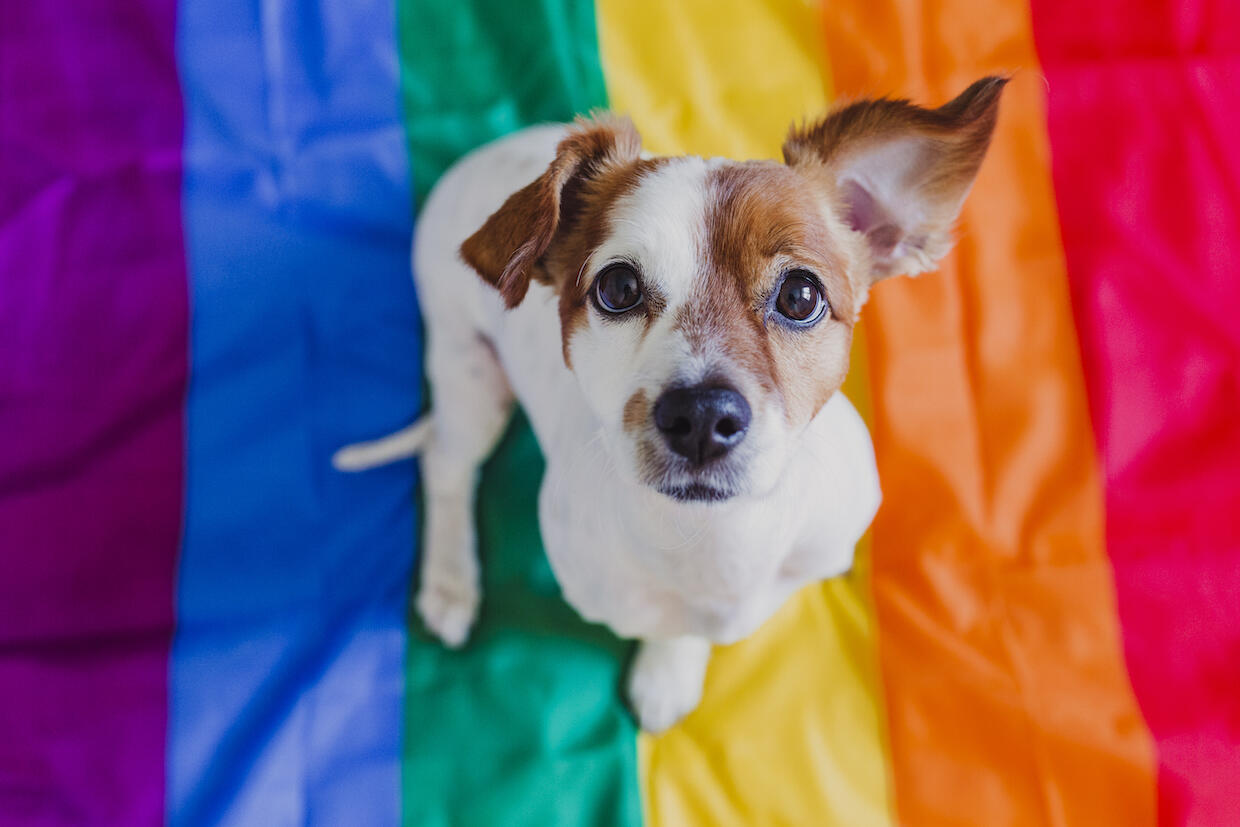
Jan. 28, 2021
Can pets help LGBTQ+ people cope with microaggressions?
Share this story
Angela Matijczak, a first-year doctoral student at the Virginia Commonwealth University School of Social Work, led a study exploring how social support from humans and comfort from companion animals can help LGBTQ+ young adults deal with microaggressions.
The study, “The Moderating Effect of Comfort from Companion Animals and Social Support on the Relationship between Microaggressions and Mental Health in LGBTQ+ Emerging Adults,” is featured on the cover of the January issue of the journal Behavioral Sciences.
LGBTQ+ people often experience microaggressions, which are typically unconscious behaviors or statements aimed at members of a marginalized group that reflect a hostile or discriminatory message. Microaggressions have been linked to detrimental mental health outcomes, such as higher rates of depressive, anxiety, or post-traumatic stress symptoms; lower self-esteem; and negative perceptions of one’s own LGBTQ+ identity.
Previous studies have found that social support from humans can serve as an important protective factor against these negative mental health outcomes for LGBTQ+ emerging adults. An unexplored area of research, however, is whether pets might also serve a protective role.

The study, which involved a sample of 134 LGBTQ+ emerging adults, found that social support from humans moderated the relationship between microaggressions and depressive symptoms. It found the relationship between microaggressions and depressive symptoms was not significant at high levels of social support, indicating the protective nature of human social support.
Comfort from pets, meanwhile, also moderated the relationship between interpersonal microaggressions and depressive symptoms. But for participants who had high or medium levels of emotional comfort from pets, microaggressions were positively associated with depressive symptoms.
“Our results suggest that the human social support may serve as a protective factor that can disrupt the harmful effect of microaggressions on depression. For folks who had high social support, there was no statistically significant relationship between microaggressions and depression,” Matijczak said.
“[For those] with emotional comfort received from pets, we saw the opposite thing happening. For folks who had high emotional comfort, there was a statistically significant relationship between microaggressions and depression,” she said. “The participants who were most impacted by microaggressions, you might say, in terms of depression symptoms were those that were receiving low social support from humans, but had high comfort from pets.”
The study does not suggest any cause and effect conclusions, as it reflects data collected at one point in time. For example, the study’s results should not be interpreted to suggest that comfort from pets causes depression.
Matijczak speculated that the study’s results might be explained by the fact that pets can add stress, which might worsen the negative impact of microaggressions on depression. Or, she said, it might be because LGBTQ+ emerging adults who experience microaggressions and depression are seeking out their pet for comfort.
“Because this is an emerging field, it's hard for us to hypothesize which explanation is more likely,” Matijczak said. “We need more research to be able to explain that.”
Matijczak is a project coordinator in the Children, Families, and Animals Research Group, which is led by Shelby McDonald, Ph.D., an associate professor in the School of Social Work.
McDonald was a co-author on the study, along with Camie Tomlinson and Jennifer Murphy, doctoral students in the School of Social Work, and Kelly O’Connor, a doctoral student in the Department of Psychology in the College of Humanities and Sciences.
McDonald, the principal investigator on the study, said the findings are important because of the prevalence and popularity of acquiring pets in emerging adulthood, and also because pet ownership has become increasingly popular during the pandemic.
“Studies like this are important because research and the media often fail to acknowledge potential risks and stressors associated with acquiring pets,” McDonald said. “Our qualitative research suggests that the emotional and financial burdens of caring for pets, coupled with reduced access to social and economic resources (which is common among the LGBTQ+ population), has serious implications for marginalized sexual and gender minority young people.”
Many people prioritize their pet’s welfare and needs above their own, she said, which is one reason acquiring pets has been linked with housing insecurity.
“When affordable pet-friendly housing or shelter options are not available, people who are not willing to be separated from their pet(s) are often placed in unsafe situations and may experience homelessness. When young people are alienated from family and typical forms of support because their human family members are not supportive of their identity, a pet may be one of the most affirming and consistent relationships in their life,” she said. “[Sexual and gender minority] young people are already at increased risk for experiencing homelessness and psychological stress, which makes it important to fully understand the benefits and risks associated with acquiring pets in emerging adulthood for this population.”
In addition to serving as the cover of Behavioral Sciences, the study is attracting interest among organizations that conduct research on human-animal interaction. Matijczak has been invited to present the study’s findings to the U.K.-based charity Dogs Trust.
Subscribe to VCU News
Subscribe to VCU News at newsletter.vcu.edu and receive a selection of stories, videos, photos, news clips and event listings in your inbox.







